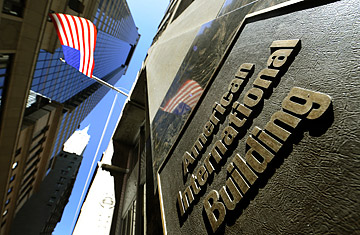
The absence of effective regulatory oversight led to inappropriate compensation payments to companies like AIG.
"Never underestimate the capacity of angry populism in times of economic stress,"
— Robert Reich, The New York Times, March 15, 2009
The profligate investment practices of the financial sector not only caused the current credit crisis but also allowed for the inappropriate compensation decisions of companies like American International Group and Merrill Lynch. Many would argue that the absence of effective regulatory oversight also contributed to both of these problems. However, equating these misdeeds with the financial system itself poses a grave risk to the economy's recovery.
Despite the public's justifiably poor opinion of many of the actors that inhabit the financial sector, spreading the blame will only hasten the economy's decline. In order for the economy to recover, the market must recover. And in order for the market to recover, America's antipathy toward the financial system must pass. (See pictures of the Top 10 scared traders.)
There has been a populist uproar over executive compensation paid to management at companies that have received financial assistance from the government bailout. These bonuses continue to receive enormous coverage in the media, inflaming the passions of voters and politicians alike. Informed by this sentiment, a New York Times/CBS Poll conducted in February found that "83 percent of respondents said the government should cap the amount of compensation earned by executives of companies that are getting federal assistance."
Less than two weeks ago, The Washington Post published an article announcing that AIG had paid millions of dollars in retention bonuses to executives of the company. Documents later turned over to the Connecticut Attorney General show that the actual figure was $218 million. To date, the government has loaned AIG $170 billion from various financial assistance efforts, including Troubled Asset Relief Program ("TARP"), in exchange for an 80 percent stake in the company. However, in apparent disregard of its unmatched failure, AIG chose to honor its employee's compensation agreements, and awarded multi-million dollar bonus to its executives.
Edward Libby, AIG's government appointed CEO, has argued that these were retention bonuses, contractually guaranteed to employees who remained with the company. It has been further argued, on his behalf, that the bonuses are exempted by the American Recovery and Reinvestment Act, which provides that restrictions on bonuses do not apply to those made under an employment contract executed before February 11, 2009. The public seems unwilling to consider his arguments.
Last year AIG admitted that the company's Financial Products division entered into credit default swap agreements with banks that bought and securitized loans. CDS are a financial instrument that mimics the characteristics of an insurance contract. These instruments were most exposed to risk when the securitization market blew up following the housing market collapse. Not only is the company almost entirely owned by the government, but many of the executives receiving the bonuses are the same executives that marketed the CDS agreements that caused its downfall. (Read "Treasury Learned of AIG Bonuses Earlier Than Claimed.")
Some of AIG's payouts were retention bonuses, the latest tin-eared act of the large insurance company. In light of the injury AIG caused the economy and the debt it owes to the government, many see these actions as an abnegation of the company's duty to reasonably compensate their employees. Responding to the public's outcry about the AIG compensation disclosure, members of the House and Senate, along with the Treasury Department, have proposed a motley mix of measures seeking to counteract these bonuses.
Obama was among the first to cry foul, instructing Treasury Secretary Geithner to "block these bonuses and make the American taxpayer whole." Afterwards, in a letter to Congress, Geithner stated that "we will impose on AIG a contractual commitment to pay the Treasury from the operations of the company the amount of the retention awards just paid." It appears that AIG's penalty will be that the Treasury will force the insurance company to pay the Treasury back with money the Treasury has already given it. Congressman Barney Frank struck a strident tone when he proposed that the government enforce its right as owners of the company. In a briefing, Frank contended that the government should exercise this right as the majority shareholder and deny payment for breach of contract. In an appearance on Face the Nation, Frank proposed that in order to exercise these rights, "what we ought to be doing is suing as a shareholder, saying, 'look these are people who were paid bonuses that they weren't entitled to.'"
Last week, marked by uncharacteristic speed, the House passed a bill that would impose 90 percent surtax on bonuses paid to employees of companies that have received at least $5 billion in TARP funds if the employee's family income exceeds $250,000. In support of the bill, Obama said he is eager to receive legislation "that will serve as a strong signal to the executives who run these firms that such compensation cannot be tolerated." The Senate plans to vote on the bill this week.
Except for some contract lawyers, very few people would argue that the portion of the AIG bonuses that was for employee retention are fair. The only reason the company isn't in receivership is because the government deemed it was "too big to fail." Fearing the financial market would be dealt a horrible blow if it went bankrupt, the government has provided AIG with several loans to prevent its untimely demise.
